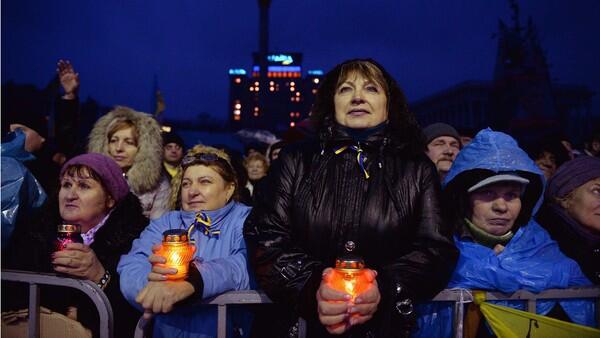
Roman Olearchyk in Kiev and Neil Buckley in London
.
Clean-up crews this week finally cleared half of Kiev’s main street, Khreshchatyk, of barricades and tents erected more than six months ago by protesters who toppled Ukraine’s president Viktor Yanukovich in February.
But on the Maidan, or Kiev’s central square, the tents remain – and last weekend saw new protests demanding firmer action against pro-Russian separatists who have taken over Ukraine’s easternmost regions.
That pressure helps explain why Petro Poroshenko – one of the protest leaders who in May was elected Ukraine’s president – surprised some international partners on Monday by not renewing a 10-day ceasefire in the east.
As Mr Poroshenko ordered a full-blown assault on the separatists, according to some unconfirmed reports, US secretary of state John Kerry phoned the president to urge him to prolong the truce. Publicly, however, the US has backed Ukraine’s position.
The president himself, in a late-night television broadcast to Ukrainians have insisted this week that he was right to resume the attacks on separatists who repeatedly defied the ceasefire, killing nearly 30 Ukrainian soldiers.
"Despite some initial pressure from the US and Europe to extend this ceasefire, in the end he took the only choice he could,” said Adrian Karatnycky, senior fellow at the US-based Atlantic Council think-tank, visiting Kiev for discussions with high-level officials.
But while inaction would have had costs, resuming fighting also carries big risks. It could lead to even worse bloodshed, or be used as a pretext by Moscow for direct military intervention.
Senior western officials, including Nato’s supreme commander, General Philip Breedlove, say Russia, after earlier moving back some of the thousands of troops it had amassed on Ukraine’s border since March, has once again built up a sizeable force.
Dmitry Medvedev, the Russian prime minister, on Wednesday called Mr Poroshenko’s decision to end the ceasefire a "dramatic mistake”.
He said: "It will bring more casualties. Returning to negotiations will be much more difficult. These are the rules of war.”
Despite the risks for Mr Poroshenko many Ukrainians are restive about the failure to quell the eastern rebellion and the possibility that, after losing Crimea to Russian annexation in March, the country could see more territory slip from its control. Domestic political pressure is mounting.
"If he continued his ceasefire, he would obviously be considered a weak president,” said Vasyl Filipchuk of Kiev’s International Centre for Policy Studies think-tank. "He would lose his 54 per cent support in two or three weeks and then he could have a new Maidan against him, very easily.”
Senior officials have suggested that Ukraine has strengthened its military forces, giving it a better chance of overcoming the rebels.
Ultimately, the continued arrival of reinforcements from Russia, even during the ceasefire, raised significant doubts about whether Vladimir Putin, the Russian president, was sincere in his claims to be committed to a peaceful solution.
Expressing a widely held view in Kiev, Vadim Karasiov, a Ukrainian political analyst, said "Putin is trying to create a long-term frozen conflict [in eastern Ukraine] to be used for years as leverage against Kiev’s leadership.”
To counter that, said Mr Karasiov, the Ukrainian president had chosen hardball tactics, betting that military victories would strengthen his hand – and make both the EU and Russia more ready to make good on their pledges at the negotiating table.
Addressing foreign ambassadors on Wednesday, Valeriy Chaliy, deputy head of Ukraine’s presidential administration, said Mr Poroshenko was ready to reinstate a ceasefire. But conditions set by the EU on Friday had to be met first – including OSCE border monitoring, freeing more than 100 hostages held by the rebels and initiation of genuine peace negotiations.
The Russian president’s offer to permit border monitoring would not have been possible without "significant de-escalation first”, said a spokesperson for the Organisation for Security and Co-operation in Europe’s monitoring mission in Ukraine. A new mandate would also have been needed for OSCE monitors to work on the Russian side of the border, the spokesperson added.
At a meeting in Berlin of the foreign ministers of Ukraine, Russia, France and Germany on Wednesday a deadline of Saturday was agreed on a series of steps that needed to be taken for a resumption of the ceasefire to be declared.
"If they want a ceasefire to work, Russia has to know that Europe will be prepared to implement another level of sanctions if they violate it,” Mr Karatnycky said.
If the gamble fails and Ukrainian forces do not make fast progress against the rebels, however, the political price could be high.
"If the war drags out and casualties pile up,” Mr Karasiov said, "then it will be soldiers’ mothers, not Maidan activists calling for an end to the ceasefire, who will come to the president’s office demanding peace and that their sons come home.”



.jpg/250px-ElbeDay1945_(NARA_ww2-121).jpg)





